 By M.P. Pellicer | Stranger Than Fiction Stories Amy Murphy, 17, died mysteriously. Her body was found lying in the Golden Gate Park on February 2, 1900. It was in a partially secluded area, down on Hayes Street by the big eucalyptus tree that stood on the left just beyond the peacock walk. First there was a suspicion she died by her own hand, but others thought it was murder. 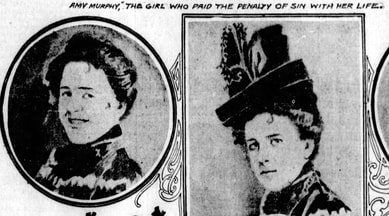 Amy Murphy died under mysterious circumstances in Golden Gate Park c.1900 Amy Murphy died under mysterious circumstances in Golden Gate Park c.1900 The gun which fired the bullet found in the girl's head mysteriously disappeared, which made the theory of "self destruction" questionable. Later it was found out she had pawned her watch in order to buy the firearm. Once her body was identified, police rounded up Horace Poulin who was supposedly the man Amy ended her life over. He was taken to the place where Amy committed the act, and then to Macavoy's undertaking parlor at 1235 Market Street to view the body. A certain Mr. Cook came forward to say he had been sitting on a bench in the park, when he heard three shots ring out. Then he heard footsteps of someone running down the path toward him. Three boys appeared; one of them with his hand under his coat as if concealing something. They seemed to be no older than 14 years old. When the boys saw him they stopped for a moment, then they ran down one of the paths and out of sight. Were they a witness to the crime, or perhaps did they take the revolver? The authorities never got an answer to that question. The mystery deepened when during the autopsy a large irregular gash was found on the right side of Amy’s head in front of her ear. Coroner Cole opined this was made by a blow with a blunt weapon of some sort, possibly the butt of a heavy pistol. There were no powder marks around it. A large caliber bullet was removed from the brain, and the question remained: which had caused her death the bullet or the blow? 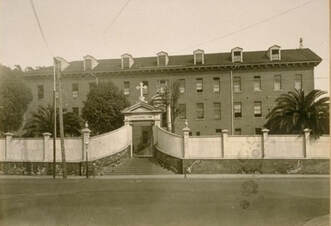 San Francisco's Magdalen Asylum San Francisco's Magdalen Asylum Amy's mother and younger sister came to the morgue to identify her. They described where Amy had deceived her family, telling them she worked at night at a telephone office, when in reality she was keeping company with a wine agent named Horace Poulin. This had been going on for 8 months. However once Poulin found out that she had been an inmate of the Magdalen Asylum he cast her off, or at least this is the justification he gave for the end of their relationship. It turned out that Amy had been sent to the Magdalen Asylum four years before. Amy's father was Dan Murphy, a liquor dealer who lived in Seattle. Several years before her parents had separated and Mr. Murphy took the two eldest children, which were Amy and Harry and the mother kept the two babies. Amy stayed with her father for a couple of years before returning to her mother in California, who in the meantime had married Captain John Creeling Dart of the steamer Sparrow. It’s not clear if Amy was sent to the Magdalen Asylum by her father in Seattle, or by her stepfather. However there was a stigma attached to a girl that had been sent there. The Magdalen Asylum was founded in 1856 by the Sisters of Mercy as a refuge for prostitutes, but in 1868 it began taking in girls who were sentenced to the city's Industrial School, which was a juvenile prison. Parents could ask the court to send their "uncontrollable" daughters to the asylum. A girl could end up there if the police charged her with "vagrancy" or for keeping company with gangsters, or prostituting themselves. Many of them were orphans. Once a girl turned 18 she could leave if her parents or caregiver petitioned it. In some cases some ran away. Soon after the turn of the 20th century it was renamed to St. Catherine's Home for Wayward Girls. It was sold to the city in 1931, where it housed the mentally ill and was a maternity hospital. 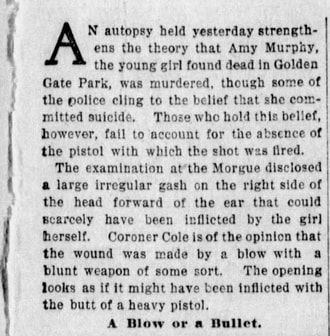 There were several circumstances surrounding Amy's death that left doubt if it was a suicide There were several circumstances surrounding Amy's death that left doubt if it was a suicide But it seemed Amy Murphy was a troubled girl, since according to her younger sister Winnie Murphy, Amy had spoken of doing away with herself, and even asked her brother Fred the best way to do it. Her siblings did not believe she would commit this act. She was described as being content in her behavior, and had gotten a job in a phonograph parlor on Kearny Street. When her mother learned she had not worked for months, she said the girl brought her money at the end of the month, claiming it was her salary. There were many times Amy would tell her mother she was sleeping over at her friend Nellie Peters' house, when this was not true. Her mother was unaware that her daughter had spoken of taking her life, only her younger sister knew of this. Winnifred Murphy quoted her sister saying, "If I don't get another position in a day or two, I will kill myself." After Amy's death, her sister said she didn't believe her sister would commit suicide, and that she was murdered by someone. Horace Poulin who was the city agent of the Eisen Vineyard Company was accused of luring a 17-year-old girl from her family with promises of "luxurious living." He gave a formal statement to the Chief of Police that read thus: I was introduced to Amy C. Murphy about last July by Mrs. Toomey, a telephone operative, who worked with this girl. About a week after I became acquainted with her, she told me how miserable she was at home. I took pity on her and told her that I would pay her what the telephone company was paying if she would come to live with me. 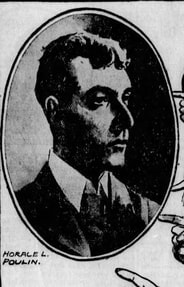 Horace Poulin who was accused of being Amy's seducer. Horace Poulin who was accused of being Amy's seducer. Under further questioning by police he said he had known Amy Murphy one week before he asked her to come live with him. He had taken her to a flat on Bush Street, and then to other places, always posing as if they were married. When asked if he intended to marry her he said, "Well, there was some talk about that between us." The police wanted to know if they had been living together as man and wife for so many months, why was he ready to discard her. Was it because she had been an inmate at the Magdalen Asylum? His reply was, "Well, I had to send her away in justice to myself." He admitted he had tired of her. He described where on a daily basis she would stay at her mother's house till until 8 p.m., then "pass the early evening as she pleased", and then around midnight she would join him at the saloon at 114 Sutter Street, which was his headquarters. When police searched Poulin's flat at 821 Bush Street, they found a number of Amy's trinkets and a pair of slippers wrapped in newspaper and thrust in a closet. 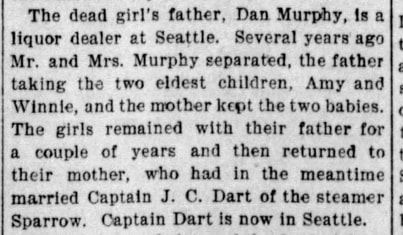 The story of Amy Murphy was followed closely by San Franciscans The story of Amy Murphy was followed closely by San Franciscans During the last time that Amy was with him, Poulin had told his landlady to keep an eye on her since she had twice attempted to kill herself, however when the landlady arrived she found all the windows were open. Was there a reason why Poulin wanted to make others believe that Amy was suicidal when she wasn’t? Then police spoke to John Planalp, 27, who worked for Sherman, Clay & Co., who sold musical supplies. He was living in Oakland for only a couple of months. He moved to San Francisco five years before from Salem, Oregon. He said he had met Amy, but she used the name of Amy Dart. They had met about 18 months before, and he had at times called on her at her mother's house. Days before her death she had sent him a letter to meet her in San Francisco a few days later, however she failed to appear on the agreed upon date. Planalp knew who Poulin was, and met him once at Amy's house, but he was unaware of the relationship he had with Amy. Amy's friend Nellie Peters, contrary to her family, did believe the girl shot herself over her failed romance with Poulin. Amy had told her that they were to be married, and were only waiting for her to turn 18. Her birthday was in February, the very month she died. No doubt Poulin had cast her off since once she turned 18, Amy expected they would be married, and perhaps that had never been in his plans. 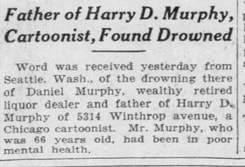 Amy's father was found floating 20 years later in Puget Sound, likely in an act of self destruction Amy's father was found floating 20 years later in Puget Sound, likely in an act of self destruction Amy told Nellie that she was unhappy because of the harsh treatment she received at home, but her troubles went back to when her mother left her father, and she and her brother were left “to the mercy of a father who was unkind." She ran away from her father and came seeking her mother who she said was not affectionate towards her, and that she was wrapped up in the child of her second husband. She was made to feel she was not wanted in her mother's home. Her mother had one daughter named Geraldine with Captain Dart who was 4 years old when Amy died. Amy said that Horace Poulin was the only person in the world who showed her any affection, or was really kind to her. Then she confided that she would never marry Mr. Poulin; "that he drank, and she was afraid she would be unhappy with him." When Nellie urged her to go and tell her mother everything, she became frightened at this suggestion. Her friend suspected that she was not telling her the real reason why she couldn’t be married to Poulin. Nellie then told her to go see her friends in Eureka and have nothing more to do with Poulin. However, Amy didn’t take this advice. Ultimately nothing came of a short investigation as to what truly happened to Amy Murphy. Some believed it was suicide, others believed it was murder. A charge of adultery made against Horace Poulin by the police, was dismissed by a judge. He was called a "street leper" by the newspapers of the area and his reputation was tarnished to say the least. 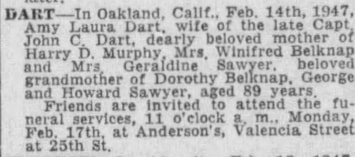 When Amy's mother died in 1947, there was no mention of Amy in the obit. When Amy's mother died in 1947, there was no mention of Amy in the obit. Horace's troubles weren't over though. In 1901, he was accused of embezzling $45 by a liquor merchant. Poulin had left for New York because of the scandal, but returned to San Francisco because of this new job offer. No doubt the sentiment of his involvement in Amy Murphy's death was still held against him. He settled the manner and dropped from sight. In 1920, Amy's father Daniel Murphy was found floating in Puget Sound. It's unknown if it was accidental or a suicide; however, he was known to have "suffered occasionally from melancholia". His obituary only referred to a son Harry Murphy, and a brother William Murphy as his surviving family. There was no sign of robbery and he had a checkbook with an $11,000 balance. Harry Murphy, which was Amy's brother, became a well-known political cartoonist who was employed by various newspapers. He had started his career when he was only 17 years old and living in Washington. He passed away in 1973. John Planalp the would-be suitor, who perhaps would have given Amy a happier destiny, died in 1927. Sources - San Francisco Examiner, Chicago Tribune
0 Comments
Your comment will be posted after it is approved.
Leave a Reply. |
Stranger Than Fiction StoriesM.P. PellicerAuthor, Narrator and Producer Archives
July 2024
Categories
All
|
Stories of the Supernatural
- Stories of the Supernatural
- Miami Ghost Chronicles
- M.P. Pellicer | Author
- Stranger Than Fiction Stories
- Eerie News
- Supernatural Storytime
-
Astrology Today
- Tarot
- Horoscope
- Zodiac
-
Haunted Places
- Animal Hauntings
- Belleview Biltmore Hotel
- Bobby Mackey's Honky Tonk
- Brookdale Lodge
- Chacachacare Island
- Coral Castle
- Drayton Hall Plantation
- Jonathan Dickinson State Park
- Kreischer Mansion
- Miami Biltmore Hotel
- Miami Forgotten Properties
- Myrtles Plantation
- Pinewood Cemetery
- Rolling Hills Asylum
- St. Ann's Retreat
- Stranahan Cromartie House
- The Devil Tree
- Trans-Allegheny Lunatic Asylum
- West Virginia Penitentiary
- Paranormal Podcasts
"When misguided public opinion honors what is despicable and despises what is honorable, punishes virtue and rewards vice, encourages what is harmful and discourages what is useful, applauds falsehood and smothers truth under indifference or insult, a nation turns its back on progress and can be restored only by the terrible lessons of catastrophe."
- Frederic Bastiat
- Frederic Bastiat

Copyright © 2009-2024 Eleventh Hour LLC. All Rights Reserved ®
DISCLAIMER
DISCLAIMER
 RSS Feed
RSS Feed
















